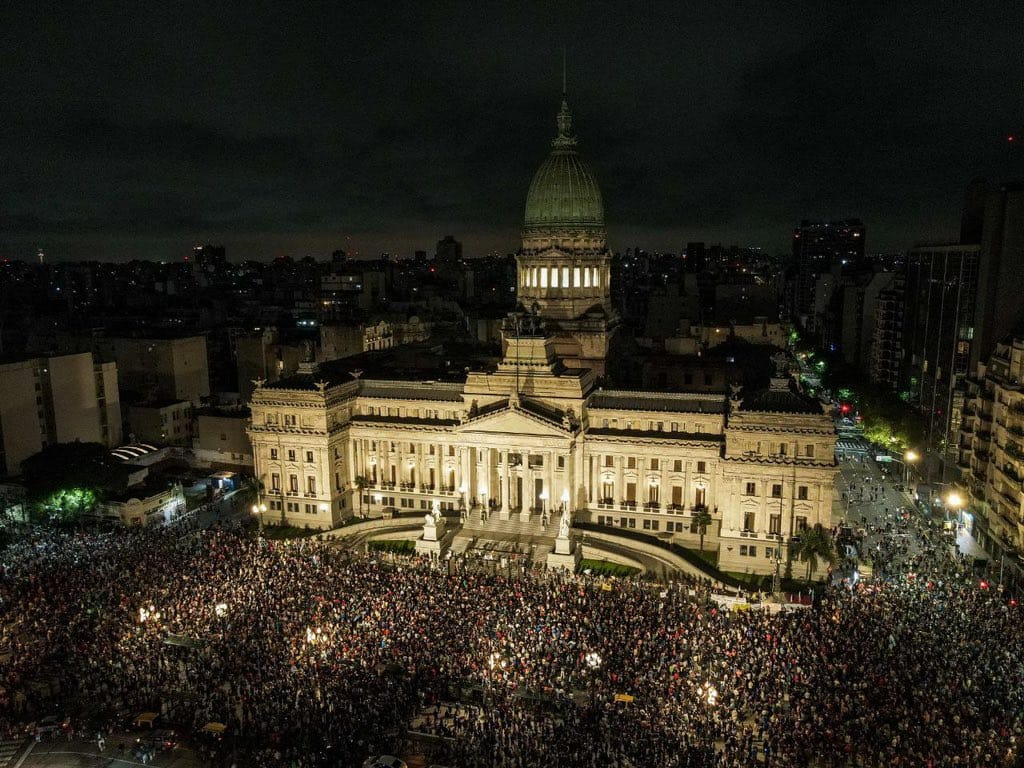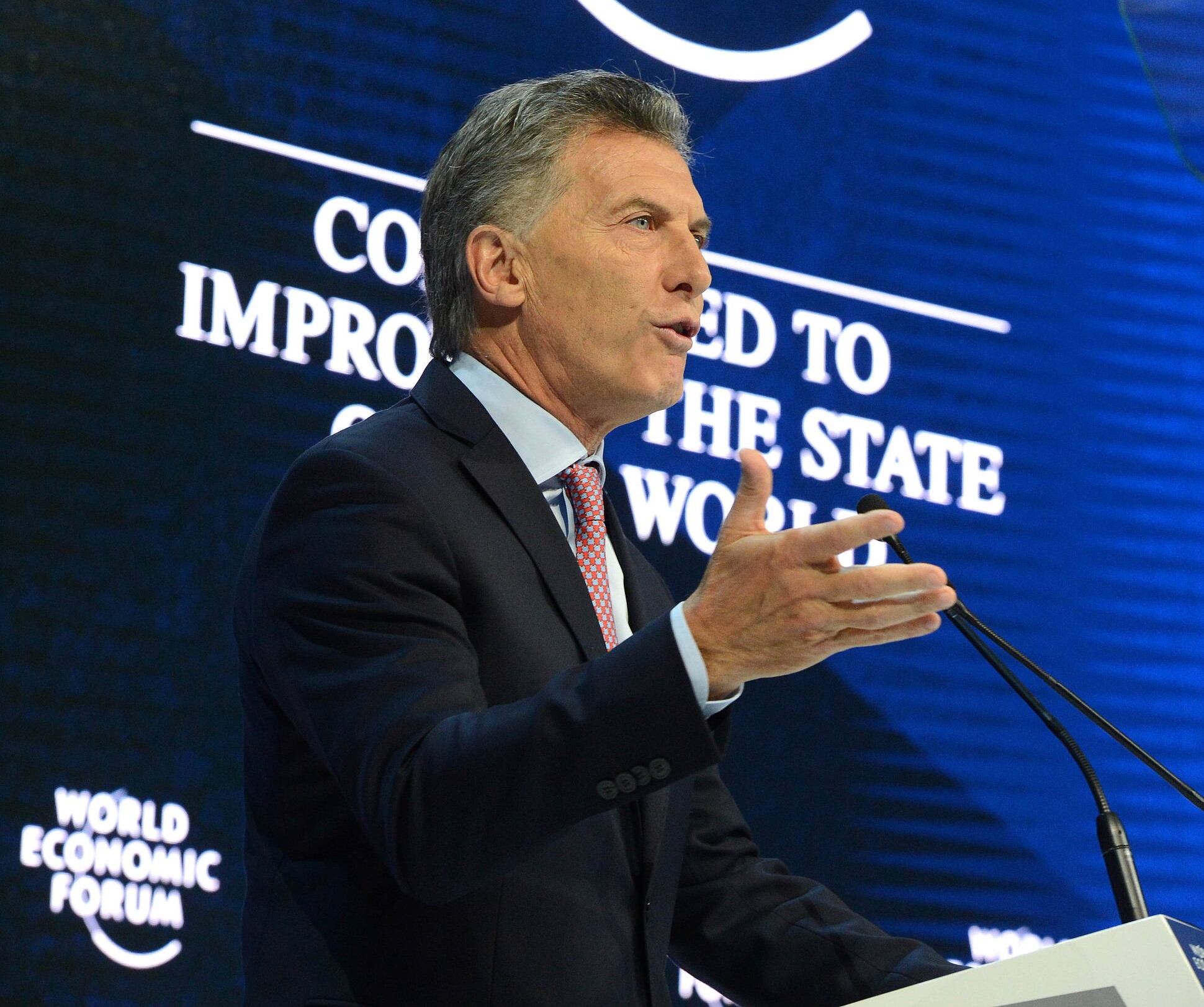
The following was first published on marxist.com on Dec. 21, 2023
As we were about to publish the latest editorial of the Argentine section of the IMT, concerning the first budget announcements of the new government of far-right demagogue president Milei, he doubled down: announcing by decree the abolition of over 300 pieces of legislation, which regulate economic activity in a wide range of fields. This is an unprecedented, ultra-liberal assault on the rights and living conditions of the working masses, introduced using undemocratic emergency decree powers. The announcement provoked a spontaneous movement of protest, with thousands coming out into the streets of Buenos Aires, as Alejandro Spezia describes in this special update (the original article follows after).
The far-right president’s first economic measures, announced one week ago, have been to devalue the peso by over 100 percent and remove state subsidies from fuel, transport, water and electricity. This sent prices soaring overnight, by as much as double in the case of food and fuel. This was on top of almost 160 percent inflation year on year. He also announced layoffs of all public employees with less than a year of seniority, the cancelling of all pending public infrastructure works, and that the government would sign no new contracts for future public works. These measures unload the accumulated crisis of Argentine capitalism onto the shoulders of the working class and poor, and fall totally in favour of big business (with bailout of the debts for importing companies, for example).
Milei’s security minister, Patricia Bullrich, announced an “anti-picketing” and anti-protest security protocol, empowering federal forces to repress protests that block traffic routes, and the persecution of the groups that organise them, without a judge’s order. This crackdown on basic democratic rights, including the right to strike, is meant to cow the movement that will inevitably follow Milei’s attacks on the working class.
Yesterday, 20 December, came the first mass protests against Milei’s government, with left parties, social organisations, and militant sectors of the trade unions marching on the anniversary of the ‘Argentinazo’, the revolutionary social explosion of 2001, which at its peak forced out three successive presidents in a single week. The marches occurred across the country in defiance of Bullrich’s protocol and police repression.
Last night, at 9 o’clock, after the marchers had gone home, Milei announced a new set of measures through a Decreto de Necesidad y Urgencia (urgent decree powers meant to allow the president to pass temporary measures in extraordinary circumstances), which amounted to a wholesale deregulation and privatisation of the economy by decree. Some of the 300+ points included the repeal of the law that regulated rent increases; a labour counter-reform to establish minimum service in broadly defined essential services, thus limiting the right to strike; the repeal of laws controlling prices; and measures taking the first steps to the privatisation of state-owned companies, such as the national airline Aerolíneas Argentinas, the state oil company, the state media companies, rail networks, and the water and sewage provider for the capital city. Argentina’s beloved football clubs will also be allowed to be privatised. The DNU also strikes down regulations over land ownership, foreign export controls, pharmaceutical production of generic drugs, workers’ healthcare plans, etc.
As soon as Milei finished reading his speech, people all across Buenos Aires flooded outside into street corners and balconies, banging pots and pans in protest against the announced measures. Among the chants that broke out were calls for a general strike, for the unity of the working class, and the iconic slogan of 2001: que se vayan todos (“kick them all out”), which Milei had cynically tried to co-opt.
In a twist of fate, exactly 22 years after the Argentinazo, the Argentinian working masses have again started to enter the political scene in a powerful spontaneous movement, as is their tradition.
While there are questions about the constitutionality of some of Milei’s measures, and a fight may ensue in Congress, the working masses are not leaving the defence of their living conditions and democratic rights to the capitalist state.
For a workers’ congress, and a general strike against Milei!
Milei implements first measures in government – misery and social crisis worsen
[Originally published in Spanish at argentinamilitante.org]
Only a few days have passed since the inauguration of President Milei in Argentina, and the measures that his government has announced have already begun to earn the repudiation of broad sectors of the masses, including sectors that voted for him.
The cuts that he campaigned on against what he calls the “political caste and its friends” ended up showing themselves for what they really are overnight: a clear and brutal offensive against the working masses, their rights, and their organisations.
In just a few days, the so-called libertarian abandoned his impossible theory of anarcho-capitalism, to fervently embrace a classic Macrist policy of cuts and indebtedness for which the masses must pay, all with the applause of the IMF. Milei is applying these policies with a crudeness and violence qualitatively greater than that of the former Macri government, which applied counter-reforms slowly in an attempt to maintain stability.
The attempt to replace the existing system of automatic increases in pension payments to increases granted by presidential decree, when pensions are already in a pitiful situation and falling behind inflation, is a move to liquidate and confiscate pension benefits following IMF guidelines.
The elimination of subsidies for transport, electricity, water and gas, the announcement that there will be no tender for new public works by the state, and the cancellation of already approved tenders whose works have not yet begun, are part of a plan to wipe out five points off GDP in budget deficits in one stroke and reach a balanced budget by 2024. The burden of these measures falls on the backs of the working class and the poorest of society. Logically, any economic policy measure that aggravates social inequality will sharpen the class struggle.
The announcements of Economy Minister Luis Caputo two days ago have triggered an inflationary process and a political crisis similar to the Rodrigazo 1975. On 4 June 1975, then-Economy Minister Celestino Rodrigo announced a plan of economic measures that included an increase in fuel prices, a devaluation of the Argentine peso, and a reduction in state subsidies.

These measures had an immediate impact on the working class and popular sectors, as prices soared and the purchasing power of those at the bottom was seriously affected. This is something quite similar to the situation today, albeit in a current context of a worse capitalist crisis than in 1975.
The announced measures brutally hit wages and put dynamite in the foundations of the economy. Milei campaigned on cutting inflation and his government has done the opposite: they are setting the stage for galloping hyperinflation. Fuel prices went from 310 pesos per litre in November to now over 600 pesos per litre, and this increase will cascade through the economy, adding to the existing inflation on the prices of the basic necessities for working families. The official exchange rate with the dollar, which is fixed by the government, went from 400 to 800 pesos, plus taxes, putting more pressure on workers’ finances.
They tell us that services in the hands of the State cannot continue to be subsidised, but at the same time they are overseeing a monumental transfer of resources from the pockets of the workers to the coffers of the capitalists, showing their hypocritical policy towards the workers.
We see that big capital is exempt from Milei’s austerity programme. The Central Bank will borrow up to 30 billion US dollars to rescue importing companies and nationalise their private debts. The Central Bank will issue ‘Bonds for the Reconstruction of a Free Argentina’ (BOPREAL), which can be bought in pesos by importers and will be paid out in 2027 in dollars.
This is a shameless issuance of Central Bank debt to take over the indebtedness of importing companies. Importers’ debt to foreign suppliers, which in recent years averaged 30 billion US dollars, ballooned in 2023 to almost 58 billion because of the lack of foreign currency generated by the drought and drop in agricultural exports. This led the Central Bank to delay or reduce foreign currency released, causing the accumulation of firms entering into default with their suppliers.
Following the agreement of the Milei/Macri/Caputo government with the banks to maintain the Liquidity Letters (LELIQ, a short-term debt instrument issued by the Central Bank), the Central Bank announced that it will maintain the monetary policy rate. Thus, the 28-day maturity LELIQ rate will remain at 133 percent. In turn, they decided to reduce the rate of one-day maturity debt instruments to 100 percent annual interest.
Unsurprisingly, the demagogue who agitated against “the political caste” has revealed himself as the most determined defender of the interests of big capitalists and imperialism.
Who pays for the Mileista/Macrista austerity?
Before the elections, we argued that we could not confront Milei and his reactionary plan with the capitalist political and economic measures of Sergio Massa and the Peronist government of Alberto Fernández and Cristina Kirchner. Posing the question as democracy vs. fascism was meant to obscure Sergio Massa’s own inevitable austerity plans. We also said that, if the false prophet Milei won, the situation for the masses would worsen exponentially. Slashing the budget with chainsaw in hand must clearly be accompanied by the repressive measures such as the protocol announced by Patricia Bullrich against social protest, itself the logical and correct response of the masses towards these cuts. The regime is attempting to legitimise the repression of the working class and to keep them as “raw material for exploitation” now that the election cycle has ended.
The class struggle is sharpening. Unions will likely be shaken up, a sign of the first tremors before a major upheaval. The task of revolutionaries is to fight for class independence. It is very likely that the need of the workers to stop austerity in its tracks will be the impetus for a fight for the political independence of our class.
The bureaucratic bosses of the General Confederation of Labour (CGT) only expressed “concern” about the measures announced by the Milei government, as well as the unemployment in the state sector and the pulverisation of wages. They continue to see their role as the guarantors of governability in the capitalist system.
They do not call for grassroots assemblies to prepare a strong workers’ response to the attacks that everyone can see coming. On the contrary, what preoccupies them is their continued management of the social insurance programmes, and to see that the corresponding booty from this is not taken from them by the Milei’s government.
Today, Patricia Bullrich announced a full anti-protest protocol. The announced measures are to facilitate police not only in smashing demonstrations or pickets, but also to prevent protesters from arriving at demonstrations.
This protocol empowers the repressive forces of the state to identify participants in demonstrations, and the security forces to act – that is, to repress – without the need for a judge’s order against the protests, until the occupied streets are open to traffic. The same applies to pickets that block the entrance to plants. In practice, they will seek to prohibit workers’ legitimate right to strike.

Wikimedia Commons
The vehicles that political and social organisations use in the organisation of pickets and protests will also be identified, and may be confiscated. To this is added a measure very consistent with Milei’s “libertarian and privatising spirit”: the financial costs of repression could fall on the organisations involved in the form of fines.
For this, the “Ministry of Repression” of the Milei government, headed by Bullrich, will include the four federal security forces (Federal Police, the Gendarmerie, the Naval Prefecture, and the Airport Security Police) plus the Federal Penitentiary Service.
There is no doubt that the ruling class is preparing to systematically repress the working class the moment it stands up to face the austerity that has already begun to be rolled out.
Initially, it is natural for a sector of the working class to react with hesitancy, and even fear, to the announcement of savage austerity and increased repression. Even more so in a context of more than 10 consecutive years of capitalist austerity and a decline in living standards.
Consequently, we can’t predict when we will see a mass response by the working class. How long the delay will last cannot be answered in advance, but it is likely to be relatively short. The lived experience of the Milei’s government, with its austerity and repression, will strip away doubts about the newly formed government from any sectors of the working class where they remain, before these sectors decisively enter the scene of the class struggle.
The same applies to the sector of workers who, looking for a desperate way out of Massa’s austerity, voted in favour of the Milei to punish “the political caste”. But in fact, today that caste has in its hands firm control of all the levers of government. The fierce anti-worker measures and the criminalisation of legitimate protest will surely push layers of this sector towards struggle in the streets, together with the whole of the working class.
Meanwhile, as the left and the vanguard of the labour movement, we must continue to advance in preparing the ground for the struggles to come. We must employ the democratic methods of our class, promoting open and fraternal debate in every workplace, factory, university, or neighbourhood.
The left parties more than ever must break with the policy of parliamentary work for its own sake in the attempt to continue winning one or two more parliamentarians. This electoral strategy made it impossible for the left to take advantage of the frustration of the masses with the Fernández government. The job of revolutionaries is the overthrow of the system as a whole.
We must prepare for the coming stage under the government of Milei, Macri, and Bullrich. We must work to lay the foundations for a Workers’ Congress that allows us, as a single body and in the broadest unity, to build a plan of collective struggle against austerity and raise the slogan of the general strike, with the perspective of establishing a workers’ government.
There is no time to lose.

